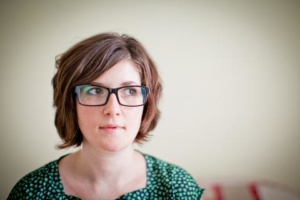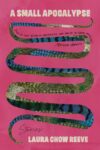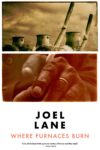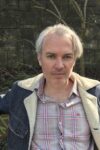 Once in a lifetime you read a book that makes you go, “Why do I all of a sudden miss sagebrush?!” And if you’re a fan of sagebrush you’re probably a fan of Nevada — the Sagebrush State, the Silver State, the Battle Born State. My best friend growing up in Las Vegas is still threatening to get it tattooed on his arm in big letters — “BATTLEBORN”.
Once in a lifetime you read a book that makes you go, “Why do I all of a sudden miss sagebrush?!” And if you’re a fan of sagebrush you’re probably a fan of Nevada — the Sagebrush State, the Silver State, the Battle Born State. My best friend growing up in Las Vegas is still threatening to get it tattooed on his arm in big letters — “BATTLEBORN”.
Fellow Nevadan Claire Vaye Watkins is the author of 2012 short story collection Battleborn, which took the 2013 Dylan Thomas Prize.
Expectedly there is a strong sense of place in her stories — an Italian tourist plunging into the daily minutiae of life at a Death Valley brothel, brothers fleeing Ohio for the California Gold Rush, and Reno hipsters overdosing on Old West irony in Virginia City.
There is also a lot that’s personal, that deals with homesickness and grief. Claire grew up in the Mojave Desert town of Pahrump, 60 miles west of Las Vegas. It seems requisite to mention Watkin’s father, Paul Watkins, was in the Manson Family and went on to testify against Charles Manson and lecture on cult psychology and substance abuse. He died when Claire was six and his history informs the semi-autobiographical, semi-fictional lead story in Battleborn.
Claire’s first novel, Gold Fame Citrus, comes out in September on Riverhead Books. She talked to me over the phone from Pennsylvania, where she teaches at Bucknell University.
Jeff Bell: In your stories you take a tone that mixes this clever cynicism and humor and irony with, on the other side, nostalgia and sentimentality. Is that something you’re conscious of doing?
Claire Vaye Watkins: I try to go easy on the nostalgia and sentimentality, but I like the tension between if you have something that’s sad and poignant and somber, but also funny and kind of raunchy. I like if there are a few different dimensions and that they’re maybe contradicting or working in different directions. I just think it gives it a little bit more depth. So often when I’m writing early drafts I will notice early on that I’m only doing one thing. And then I’ll think,
“What’s the opposite of that?” If the story is super sad, how can I make it really funny, or so on. So I guess you could say it’s a very conscious thing — parts of it at least.
I’ve heard the stories in Battleborn came out of a homesickness you had while you were studying in Ohio. Did writing it serve as a sort of therapy for you?
Maybe on some level that I’m not totally aware of, but I actually think of it a lot more as just work. I’m at the desk every day and trying to write. I’m a really, really slow writer. I don’t like to just gush out, so it’s not really akin to doing a diary or journaling. In fact, I’m often in therapy and my therapist will say, “Oh you’re a writer! You should journal about you feelings.” And I’m just like. “no,” and shut it down. I’m not going to journal about my feelings, which is probably why I don’t make much progress in therapy. I guess I am writing about my home and people who are lost to me, and trying to figure them out a little bit. So I think there is an element of catharsis to it probably. Although, I don’t want to give the impression that it’s just a solipsistic, I-focused endeavor. But definitely a bit of homesickness. I really wasn’t writing about Nevada at all until I moved away to Ohio. My mom had just died and I think there was an element of, the stories that I wrote that happened to be good or had potential at least, they were the ones that I thought were saying something urgent and private about what was going on with me — in terms of homesickness and also grief, and just basically being young and little bit lost and not really sure what I’m supposed to be doing with my time. It seems so much just the archetypical twenty-something, but hopefully a little bit more stylish than that.
It seems like every write up about you compares you to Cormac McCarthy or Annie Proulx, and part of me thinks it’s just a lazy “here are some other authors writing about the American West” comparison. Are these the types of authors you were reading?
No. In the case of McCarthy and Annie Proulx I really haven’t read that much of their work. Although those comparisons are so funny because a lot of times they just come from your press release. Your press release is made from your author questionnaire, where you’re asked to say, “Who would you compare your work to?” And then you’ll say maybe Cormac McCarthy in that we’re writing about the West, etc. And then three months later someone’s like, “You’ve been compared to Cormac McCarthy!” And you’re like, “Yeah, by me.” Like, I myself made that comparison. But in terms of the writers who I was really into, they would be Joy Williams and Joan Didion and Ben Fountain and Louise Erdrich, who’s pretty important.
You mention someone like Joy Williams, who takes a very strong environmental angle. Seeing as your new book is about the water crisis in the American Southwest, is it fair to say you’re taking an environmental stance with that?
I don’t know if it is really. It’s funny because I’m not very good at talking about my own work, so I’ll just tell you what it’s like. It basically imagines the culmination of the droughts in the Southwest, but it’s still very character-driven, still very much a story. But it is I suppose playing out some environmental anxieties and fears. I don’t know if you felt this way, but growing up in Nevada I felt like there were people who would admit that basically we weren’t supposed to be there the way we were. But then there were people who would completely deny that and would have the weirdest evidence for it. Like my step-dad would be like, “Oh no, they just built a new water treatment facility at Lake Mead, so it’s fine.” And I would just think that’s evidence for what I’m saying, that it’s trouble. So I would get freaked out by that as a little kid, trying to figure out were we doomed or not. I’ve always tried to write my nightmares, the things that I keep thinking about and worrying about. So the water was a big one. So I’m definitely a sympathizer with Joy Williams’s environmental politics, but I recognize that wouldn’t really make for a great novel. It’s wonderful for an essay, and Joy Williams writes wonderful essays, but I don’t think that a novel is the best place to have a think piece.
You’ve said you started thinking about your new book as a sci-fi, apocalyptic scenario, but then it turned out, especially with the recent droughts in California, to be not far off from the reality. Is sci-fi a genre you were serious about exploring?
Actually I really was thinking I want to try to get better at writing beyond the aesthetic of realism. I guess I was envisioning some big disaster porn, sci-fi, Margaret Atwood-type dystopian thing. But the more research I did the more it seemed like actually the scenario was more realistic than ever. But it’s still a little bit exaggerated. All my stories are a little bit exaggerated. It’s not like Alice Munro realism or Updike realism. I think that some types of realism are like the types of paintings that you might mistake for photographs. But mine are probably never going to be mistaken for photographs; they’re never going to be taken for exactly real people. They might seem a little bit recognizable, but it’s all exaggerated. So the novel is even more that. It’s a scary idea but it’s mostly pretty funny. That sounds weird to say and I feel a little bit weird saying that when people are really struggling with the issue, but that was my idea going back to that habit of mine that you noticed about mixing different impulses in the same piece.
That realism is there when you read a story like “The Diggings,” which is more historical, or really any of your stories where real places are very important to form. How much research goes into that realism or is it just, as you were saying, more of an approximation of realism?
I think I really need to get the lay of the land before I can really get into a story. I have to have a pretty good sense of where we are right away. I think setting sometimes is treated as an afterthought — got my characters, got my plot, and then, whatever, it happens somewhere. But to me it makes a huge difference if it’s Lake Tahoe or Lake Mead. That’s like night and day, that’s a different people. I am not so worried about getting everything exactly right, but I need to have it all in my head laid out. Sometimes I’ll draw maps or I have some trips that I’ve taken to certain places that are in my mind that I’m obsessing over. In my novel I was struggling for about a year to figure out how it would end, and then I went on this trip to the Owens Valley on the eastern part of the Sierras and when I was there it all clicked. I felt like once I knew that the characters would be in a place like that, then I knew what they would do and what the thematics would be and how the language should be working. All kinds of stuff came out of just orienting myself in space.
A lot of the American West, especially places like the California or Nevada desert and Reno and Las Vegas, is frequently characterized in literature as this place you pass through, it’s transformative and surreal, and you leave with a story, and the locals there are hard, rough men who never got out. But in a way you’re showing these locals are very normal, and those surreal elements, like the desert and brothels and sitting at video poker while you have a drink, are really just banal parts of growing up there and weirdly form the nostalgia that one feels for home. Do you feel like the West has been mischaracterized?
I do think that we tend to swing in one of two big ways, which is either super romantic, like the literary equivalent of a sweeping shot of Monument Valley, this natural sublime. Or it’s completely grotesque and threatening, like The Hills Have Eyes kind of thing, where exactly like you say, there are people who never got out. I was always wanting to acknowledge those versions of the West that exist in our cultural imagination and then also nuance and complicate them a little bit more. So I think a lot of the characters in Battleborn are themselves aware of the myth of the American West. There’s that Italian who’s visiting and he has this idea of what they were supposed to do on their trip. Or there are the brothers who go out west and, even already, the American West is there made in the imagination, with brochures and all this hysteria about the Gold Rush. So a lot of the characters are holding that brochure version of the West, or the scary version, up against their actual experience and bouncing off popular culture to make sense of themselves.
It’s interesting showing that side of it because, and you probably get more of this because you’re actually from a small place, but people outside of Las Vegas are still shocked that normal people do grow up there or in the desert, and they’re holding it up against the romanticized notion they have of it as a place.
Vegas has a lot of that, doesn’t it? One of my students was doing a presentation about The Stand by Stephen King, and apparently Las Vegas is the place where all the evil people who survived the apocalypse go. Like, whoa, those are actual people who live there.
You have a fairly unique biography because of who your father was and the small desert towns you grew up in. When you write about that in the first story, in “Ghosts, Cowboys,” it was really written in the best possible way because you have this sense that the reader will know at least a little about who you are. Did you feel any obligation to “get it out of the way” or address it?
Not that I was totally conscious of. In fact, I originally had that story as the last story, but I rearranged it. One of my readers said it was the best story and I should put it first. So I was like, “Okay, you’re right. That’s a good idea.” Now I can totally see it teaches you how to read the rest of the book. It’s not going to be a Manson Family memoir; it’s going to be funny and weird and a little bit gross or shocking, but also with a lot of beauty and affection in it too. I think I was actually a lot more interested in people like Tim O’Brien and using meta-fiction. Or like in Slaughterhouse-Five — I think the first line of Slaughterhouse-Five was something like, “All this really happened.” I thought that was so ballsy to start a novel with that. You’re like, “No, you’re breaking the rules! It didn’t happen, it’s a novel.” So I wanted to write a version of The Things They Carried or Slaughterhouse-Five, but that was set in the Wikipedia age, so that it was the knowable facts are “Yeah, yeah, you know about this. You can figure that out.” If we have all the information available to us, but we still have this sort of emptiness, what are we supposed to do with that? If you’ve Googled all you Google and you still don’t have answers to your questions, then where does that leave you?
Has writing about Nevada and the West and the desert, and thus becoming very associated with it, helped you understand it better or understand yourself better and your own biography?
I think so. People read the book and strangers will say, for example, “You wrote a book that’s all set in a similar area, and yet they’re not linked stories in any way and none of the characters cameo into and out of each other’s lives. So doesn’t that suggest that the way you see the world is rather isolating?” And I go, “Oh, I guess it does.” So there is this space of vulnerability when you have it out there.
Can you tell me a little bit more about The Mojave School and how you’re involved in that?
It’s really simple actually. I think I probably have survivor’s guilt from growing up in a place like Pahrump and then going on to get a really good education and getting paid to make art. I’m always reminded of that because I spend a lot of my life in pretty privileged spaces, like universities. For a few years I was feeling really disconnected from who I felt I was and really uncomfortable with the amount of privilege that I’d been offered and wasn’t really doing anything. So my husband and I started this week-long creative writing camp for teenagers in my hometown. I think it’s just the only thing that I have to offer. I am not a social worker; I’m not really useful. My skill set is not of use to many people who are in need. But I’m trying to give what I can, when I can. And also it’s good for me because I get to return home and meet young people who are coming from a totally different sphere of experience than most of the university bubble that I exist in most of the time, which is nice and comfortable but I can sense already that it wouldn’t be good for me to only be in the ivory tower, as they say.
When you teach is there any philosophy or anything you try to impart that’s unique to the school or the place?
There’s a campaign for historic buildings called This Place Matters, and they do it in Las Vegas every once in a while when an old, important building is going to get torn down they’ll try to rescue it.
Which happens very frequently . . .
Right, exactly. So I guess our secret credo would be that even though these kids grow up in a place that is called actual nowhere, “The middle of nowhere, there’s nothing out there,” — It’s annihilated by our societal discourse — even though that’s where they are and they’re disadvantaged in so many other ways, they might still have stories to tell and their experience could be made into art if they’re so inclined. I think that’s the message I got when I was young and I wanted to maybe help them get it too if I can.
Jeff Bell is a Las Vegas-raised, New Zealand-based journalist. He also blogs about showers.
This post may contain affiliate links.







